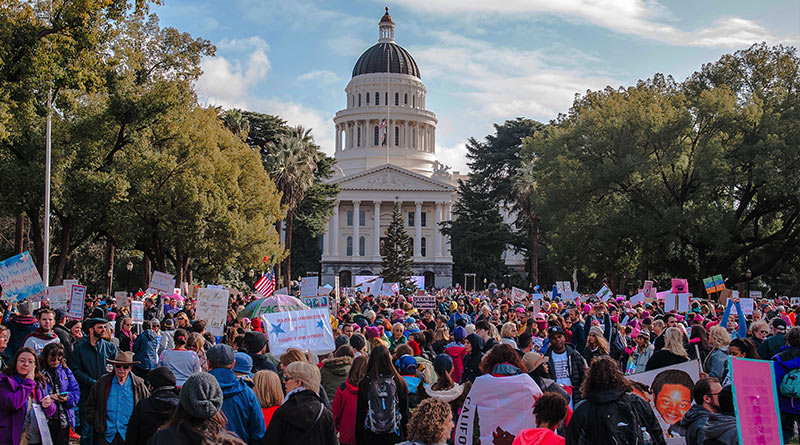Strong show of solidarity at Women’s March on Sacramento
By Dorothy Mills-Gregg
More than 20,000 people turned out for the Women’s March in Sacramento on Jan. 21, the day after the presidential inauguration, to protest gender and civil rights actions by President Donald J. Trump.
“There is no time for fear. Fear is a liability. We are not ever going back,” Sacramento Councilwoman Angelique Ashby told the massive crowd gathered at the steps of the state Capitol, according to media reports. “Politics is divisive, but equality is not… It’s just not controversial to treat people fairly.”
Ashby, the only female member of the Sacramento City Council and the former opponent to Mayor Darrell Steinberg in the recent election, stood with Steinberg in solidarity at the event.
Steinberg recently reaffirmed Sacramento’s status as sanctuary city and vowed that local government will not participate in proposed federal immigration actions.
Recently, Trump signed an executive order to build a wall at the border of Mexico, and instituted a temporary ban on immigrants from some Muslim-majority countries. That ban has been stayed by a federal judge.
“If you govern by breaking people apart and targeting Muslim Americans, women, immigrants, then you’re in for a big fight,” Steinberg said at the rally. “We have not lost our ability to stand and march together.”
Steinberg also said the march, the biggest in decades in Sacramento, was, “the opposite of human carnage,” referring a remark that Trump made at his inaugural speech.
The Sacramento march was one of 673 “sister marches” that took place around the globe.
Women’s March participants filled Southside Park and marched more than a mile with pink hats and home-made signs to the state capitol. The hats, many with cat ears, were a symbol of the march and a reference to Trump’s remarks earlier in the campaign suggesting he could make sexual advances on any woman of his choice.
Along the way, marchers chanted, “Love! Not Hate! That’s what makes America great.”
Many carried signs denouncing Trump and demanding to see his taxes.
At the Capitol, there were sign-making booths and tables for the Sacramento LGBT Community Center, a group that organizes disabled youth, WEAVE, and My Sister’s House. Speakers called for reproductive rights, education for all, good jobs, safe neighborhoods, equal pay and equal rights.
“Women’s rights are workers’ rights, and women’s rights are human rights,” Alejandra Valle from SEIU United Service Workers West told the crowd in front of California’s Capitol.
“Trump attacked women, and these words aren’t just words,” she said before she took the stage.
Valle talked to marchers about the sexual harassment and assault many night-shift workers have faced and read aloud a letter by rape survivor Leticia Soto to her attacker.
“I lived nine years in silence. And I didn’t report you to the authorities. I never went to a hospital, afraid they would call police. I never went to the police, afraid they would call immigration. And we all know what happens when immigration comes knocking – separation from your children, and deportation.”
Last year, Gov. Jerry Brown signed a bill to provide protections for workers experiencing rape on the night shift.
Valle continued that this year’s election winners have the “intent to divide us, saying, ‘boys will be boys.’”
“Let us say loud and clear,” Valle rallied the crowd, “Our difference is our strength.”
She said Trump’s proposals are going to expand the underground economy as workers become scared of deportation and go farther underground for jobs. Meanwhile, corporations and employers who want to make money off cheap labor will make them work in fear.
“We need more protections so people speak up,” Valle said. “We need to get people to feel safe and speak out.”
“When I say ‘Invisible,’” Valle told the crowd, “you say ‘no more.’”
The union’s work is the “real, day to day grind of getting people together,” said Jessica Bartholow from the Western Center on Law and Poverty hours before she took the stage.
Unions bring people to their elected officials to talk about what it’s like to be a woman or a minority, Bartholow said.
“Today, we are coming together with our allies to say that we will together work against a government that appears to be working against us,” she said. “This movement is in the same spirit of organized labor.”
Other speakers included Assembly members Susan Talamantes Eggman, D-Stockton, and Jim Cooper, D-Elk Grove and State Sen. Dr. Richard Pan.
Eggman, a member of the Legislative LGBT Caucus, told the crowd what they are seeing is “the last gasp of the old ways; they’re desperately trying to hold on.”
She further rallied the crowd, asking, “Are you ready to lead? Ready to serve?”
Steinberg, too, called for leadership and said Sacramento will be a model of inclusion and acceptance.
State Controller Betty Yee focused on how women are protesting the same issues again, but are standing on the shoulders of those before them.
Yee called for marchers to take their oaths as many officials recently did theirs:
“I do solemnly swear that I will get up. I will stand up. I will step out and speak out every day for human rights.”
Yee concluded her speech, “And we will stand together. Because it’s not about diversity, it’s about numbers.”
